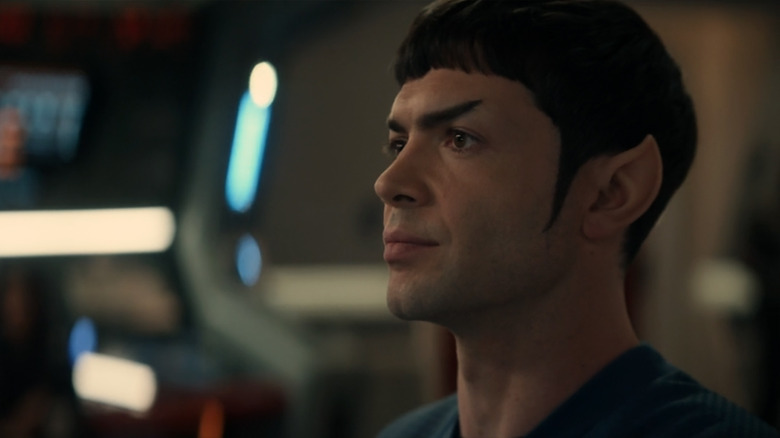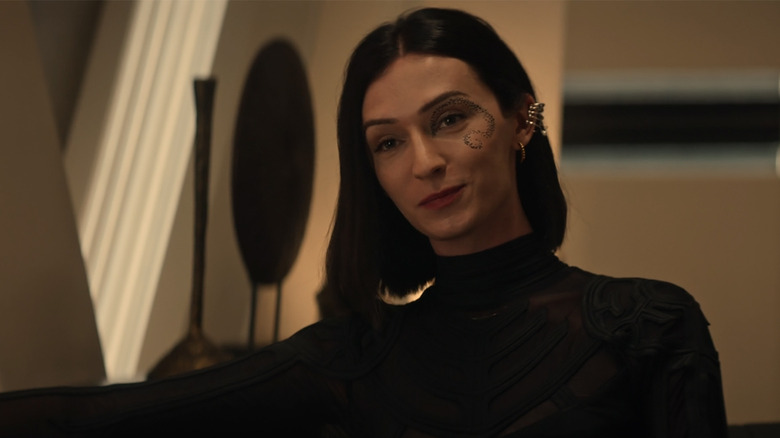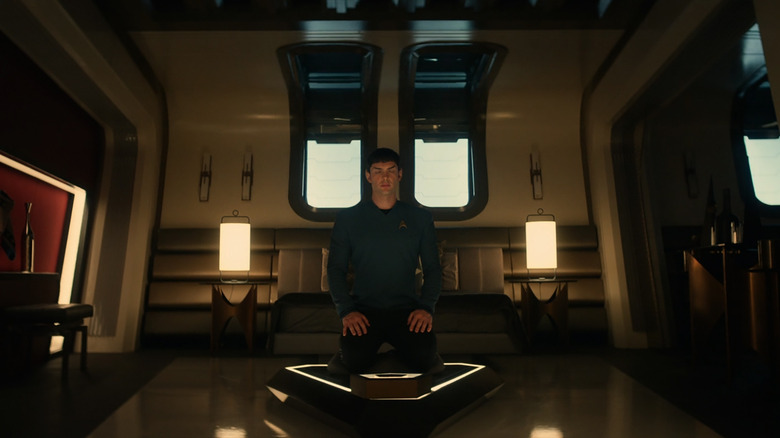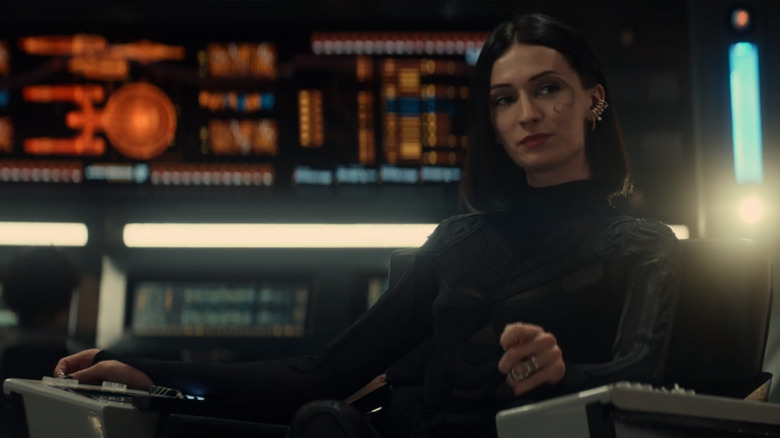Star Trek: Strange New Worlds Just Showcased One Of Its Most Effective Metaphors Yet
This post contains spoilers for "Star Trek: Strange New Worlds" episode 7.
Vulcans are by their very nature binary creatures. Their culture revolves around logic, using structured methods of deduction to arrive at the most rational conclusion. Things are either just or unjust, logical or illogical, correct or incorrect, with no shades of gray between. Contrasted with the messiness of humans, Vulcans see life very clearly. The problem is when a Vulcan doesn't quite fit into that rigid structure, as is the case with the half-human Spock (Ethan Peck). In this week's episode of "Star Trek: Strange New Worlds," Spock is forced to confront the fact that he simply doesn't fit into the binary between human and Vulcan, leading him to confront and accept his human side. Every version of the character has wrestled with his dual nature, and to great effect, providing a not-so-subtle metaphor for multiracial people who feel like they don't fit neatly into the cultures they come from because they share qualities of both. In episode 7 of "Strange New Worlds," "The Serene Squall," that crisis of identity is used to represent people who don't fit into the gender binary.
Spock is confronted about his wavering identity by a new acquaintance, a non-binary former Starfleet counselor named Dr. Aspen (played by trans actor Jesse James Keitel). They push him to start thinking about things outside of binary structures, embracing himself as simply Spock instead of "Spock the Vulcan" or "Spock the human." The metaphor is, as the man himself would say, fascinating.
Identities that exist in-between
Identity is the theme of this week's episode, and the main plot revolves around Spock, whose long-distance relationship with his fiancée, T'Pring (Gia Sandhu), is a little strained. She wants to learn more about his "human" side, which he hasn't even fully explored, and it makes him uncomfortable. Meanwhile, Dr. Aspen arrives on the Enterprise after requesting their help with some space pirates, and they have some unasked-for but excellent advice for Spock:
"You know, all species put things into boxes. It's like you're either this or you're that, and sometimes we act a certain way to fit people's expectations but that's not necessarily who we are."
As someone who spent more than 30 years of their life trying to fit into boxes, that advice hit hard. I grew up watching "Star Trek: Deep Space Nine," and had always identified strongly with Jadzia Dax, a Trill who had the memories of men and women despite currently presenting as a woman, but it took me much longer to have the language for myself: I'm non-binary. The very concept is confusing to some, and Spock wrestles with the idea of the "in-between" himself when exposed to the idea of a third option: "That is nonsensical. If I am not human or Vulcan, what am I?"
Dr. Aspen later reveals that they have been playing with identities, and are actually the leader of the pirates, Captain Angel. They manage to take over the Enterprise and try to ransom Spock to T'Pring in exchange for their husband, a Vulcan prisoner. Spock manages to save the day by faking an affair with Nurse Chapel (Jess Bush) so that T'Pring can save face and refuse the exchange. It's a very human decision, based on a gut feeling, and it forces Spock to truly confront a part of himself that he had chosen to ignore.
Breaking binary thinking
After their delicious heel turn, Captain Angel explains that while they might have hidden their real name and intentions from Spock, they had been honest about everything else. Keitel leans into the villainy a bit, really vamping it up and enjoying telling the logical Spock that there is so much more to life if he would just stop following the rules. Before using the universe's coolest necklace to teleport to an escape ship, Angel gives one last bit of advice to Spock:
"I urge you to consider that you do not need to be either Vulcan or human; that is and always has been a false choice. The question isn't what you are, it's who you are."
With regards to gender, being non-binary can mean a lot of things. It can mean the person feels they are both genders, neither gender, somewhere in-between, or it can vary based upon circumstances. There are many different identities that all fit under this one term, this label that is in its own way a freedom from labels. Breaking outside of the socially constructed gender binary can be terrifying, and it's easy to understand Spock's hesitance to step outside of his own binary thinking. In addition to starring trans non-binary actor Keitel, the episode was also helmed by trans director Sydney Freeland, bringing authenticity and perspective both on and off-camera.
I spent most of my life like Spock, trying to figure out exactly where I fit. Just as he tries to be completely Vulcan and ignore his human side, I tried my hardest as a child to be the girl I was supposed to be. Femininity was a role that I was supposed to perform, and though it mostly felt false, I learned how to follow the rules. For many years, especially my teenage ones, it was kind of like wearing a mask most of the time. Like Dr. Aspen said, I acted a certain way because it was what was expected of me, but it wasn't necessarily who I was. Gender was always a performance, an afterthought, a set of rules I tried to follow exclusively for the benefit of others. Abandoning that pretense was life-changing. It let me stop worrying about the "what" of my identity, and start embracing the "who."
A masterful metaphor
Spock comes to the realization that he is simply Spock, a unique person who is more than just the sum of his parts. He is more than half-Vulcan and half-human, he is fully, simply Spock. Instead of trying to "balance" the two halves of himself, he's realizing that he can take bits of both, or ignore them entirely, and that who he gets to be in the end is entirely up to him. It's transformative and transhumanist, expanding ideas that we are so much more than our cultures or biology dictate. Figuring out that I didn't have to follow the set rules for being male or female was one of the most wonderful moments of my life because it freed me from forcing the mask and allowed me to simply be. Gender roles and norms vary from culture to culture and change as trends evolve, so why should anyone have to follow them if they're as imaginary as the holodeck? Trying to be "a girl" limited me as much as trying to be fully Vulcan limited Spock, and unlocking the ability to express myself without the confines of womanhood feels like a superpower. I'm not a man or a woman, I am simply "Dani." I spent years of my life saying "I'm not like other girls" because, lo and behold, I'm not a girl.
"Star Trek" has always been excellent at using metaphors and allegory to make its progressive ideals palatable and understandable to the average viewer. Over the years, the franchise has used the technique to comment on all kinds of topics, including race, sexuality, and mental illness. "Star Trek: Strange New Worlds" has already proven itself to be the best of what streaming "Trek" has to offer, and if it continues to be this profound, it might be among the best "Star Trek" series overall. I look forward to seeing Captain Angel again, too, because they are one fantastically fun villain in a long line of "Star Trek" mischief makers.
New episodes of "Star Trek: Strange New Worlds" premiere Thursdays on Paramount+.



